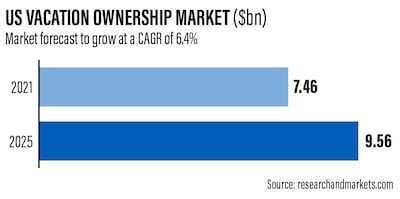When Ellen Callis, a 68-year-old retired high school teacher from Phoenix, Arizona, first dipped her toes into the timeshare property market in August 2008, she was helping a colleague who was experiencing financial difficulties.
After investing in a second property in 2013, Ms Callis now says she has buyer’s remorse – she is one of a growing number of timeshare owners desperate to quit burdensome contracts that extract hefty fees even when properties are unavailable to use.
"I am loath to add up how much I lost overall," Ms Callis tells The National.
"Neither was an investment; my investments are to make money, not toss it to the wind. I purchased pipe dreams of spending good times with family or friends, not investments."
Ms Callis paid her former colleague about $3,000 for the timeshare property at the Wyndham Vacation Resort in the town of Flagstaff, 240 kilometres from her home and best known as the training base for Apollo 11 astronauts Neil Armstrong, Buzz Aldrin, Michael Collins and Charles Duke before they landed on the Moon in 1969.
In 2013, Ms Callis invested in a second timeshare property in the picturesque city of Sedona, Arizona, after attending an information breakfast hosted by Wyndham. Ms Callis bought both timeshares sight unseen.
“Sedona seemed like an attractive place to enjoy a vacation, especially during the autumn apple-picking season,” she says.
Wyndham Vacation Resorts did not respond to requests for comment.
Ms Callis is one of an estimated 10 million Americans who own timeshares in an industry that dates back to the early 1960s. The self-catering timeshare concept started in Switzerland in 1963.
It is a form of holiday ownership, in which a person owns a "right" to use a week or weeks in a resort property, the UK-based Timeshare Consumer Association says on its website.
Worldwide, the industry is worth an estimated $14 billion a year, according to research by business analyst Brandon Gaille.
There are timeshare properties in an estimated 180 countries and more than 20 million households around the world have ploughed money into them, according to statistics by the Timeshare Consumer Guide. More than half are in the US with over 206,000 units spread across 1,500 resorts, while Europe has about 25 per cent of the share, it adds.
Hotel groups including the Wyndham, Disney Vacation Club, Marriot Vacation Club, Hyatt Residence Club, Hilton Grand Vacations and Diamond Resorts are the major timeshare players in the US.
The principle underpinning timeshare properties is that ownership and running costs are shared, theoretically making a holiday home affordable. With an average price in the US of around $20,000 and maintenance charges of $880 a year, timeshares seem an attractive option.
But from a consumer’s point of view, there is a major issue. There is no guarantee when they get to use their timeshare unless they signed a "fixed-week" contract.
Many timeshares are sold on "floating" contracts and competition for prime weeks is fierce, as Ms Callis discovered.
"They told me I had a brief advance period of time to secure my use of my week," Ms Callis says.
"If I missed the window, it went to the next person. I was forever late booking but never knew just what the timeframe was. I have no idea how many times the unit was sold. Perhaps for as many weeks in the year as they can sell it.
"Obviously, popular seasonal weeks, as for skiing or autumn leaves, are sold fastest. Any time I wanted to use Flagstaff or Sedona, they were always booked. I could never snag the times I wanted.
"The bills kept coming; I had never been to the Sedona timeshare and I only was able to use the Flagstaff property in 'my week' once."
Despite not being able to use the properties, Ms Callis was being charged monthly maintenance fees of between $100 and $200 for each timeshare.
Ms Callis says she was not looking to make money out of her timeshares, which was just as well.
"Timeshares are a terrible investment because most people won't use it long enough to make it worth the money," Sam Dogen, an investment expert who runs the Financial Samurai advice website, says.
"Furthermore, there are often ongoing usage fees and maintenance fees even if you don’t use the property. If you ever decide to sell a timeshare, it may be impossible, unless for a great discount, due to the lack of liquidity in the secondary market. My advice is to stay away from them."
Paul Charles, the chief executive of consultancy The PC Agency and one of the UK's leading experts on the travel and holiday market, agrees.
“The timeshare market is shot to pieces,” he says. “These are assets in decline and I think experts want more flexible arrangements."
Over the years, the industry has faced accusations of unethical practices and misleading customers about the benefits and costs of timeshare ownership.
In the US, regulation of the timeshare industry is left to individual states. In 2017, Arizona settled a case with the Diamond Resorts Corporation after receiving more than 500 complaints alleging the company used "deceptive sales practices".
Consumers were allegedly misled over how much maintenance fees could increase every year, their rights to rent out their properties or sell their shares.
The agreement, reached with Arizona’s Attorney General Mark Brnovich, allowed consumers to surrender their timeshares without any further obligation.
Diamond Resorts, which has a network of more than 379 destinations across the world, is also facing a class-action lawsuit from disgruntled owners in Arizona, Colorado, Indiana, Nevada and Baja, Mexico, accusing the company of inflating fees to cover operating expenses.
In 2018, a study by the University of Central Florida found that 85 per cent of timeshare owners regretted their purchase.
However, in 2019, the American Resort Development Association, the trade association that represents the timeshare industry, said on its website that 85 per cent of timeshare owners are content – even if the remaining 15 per cent were unhappy.
These studies were carried out before the Covid-19 pandemic, which left millions of timeshare owners unable to use their timeshare properties because of travel restrictions.
Another factor in the groundswell of discontent is that the first generation of owners are now well into their 60s and the attraction of their timeshares is waning. Advanced in years, some are in poor health, making travel to their properties more difficult.
But as the owners discovered, timeshares are notoriously difficult to sell on, especially in the US where most contracts have a perpetuity clause, which means the obligations are passed on from generation to generation.
This means that a timeshare property forms part of an estate, which can be a welcome gift. But for many, they are a financial millstone.
Timeshare owners in Europe are in a better position and protected by a 2008 European Union directive that outlawed perpetual contracts. The Spanish Supreme Court also imposed a 50-year limit on timeshare contracts signed after January 5, 1999, while Australian law now caps contracts at 80 years.
Gordon Newton, president and founder of the Newton Group, which specialises in helping owners exit their contracts, estimates that as many as one million people in the US are desperate to offload their timeshares.
"There is also a life cycle of ownership and there are many owners who loved their timeshare experience but are simply ready to end it. They are no longer travelling and don’t need it," he says.
For a fee of $7,000, Mr Newton succeeded in extricating Ms Callis from her timeshare contracts.
The company, which says it represents thousands of clients a year, charges a flat fee for its services. It negotiates with the timeshare resorts to agree an exit fee from the contract. If a deal cannot be reached, the company enlists the help of lawyers.
In most cases, clients will see a return on their timeshare exit fee after three to five years, Mr Newton says.
While the Newton Group delivered for Ms Callis, there are many unscrupulous operators in the burgeoning "timeshare exit" industry, Mr Newton adds.
Using hard-sell tactics similar to those used to lure people into timeshare ownership in the first place, the exit companies charge upfront fees that can be as high as $10,000.
Ms Callis turned to the Newton Group, having previously attended a breakfast for disgruntled owners hosted by another timeshare exit company.
As far back as 2014, the US Federal Trade Commission warned consumers about rogue timeshare exit companies, which, for a fee, promise either to help rip up the contract or offer to sell the property – before disappearing with clients' money.
The Better Business Bureau, a non-profit consumer protection organisation dating back to 1912, has been flooded with complaints about the activities of some of the exit companies.
"Unfortunately, we continue to hear stories from consumers who put their trust in third-party companies to rid themselves of their unwanted timeshares, only to find themselves deeper in debt," Michelle Corey, president and chief executive of the bureau in St Louis, Missouri, says.
States have moved against some of the bogus exit companies, Ms Corey adds.
Just last month, Leslie Rutledge, the Arkansas Attorney General, announced a $2.6 million judgement against Real Travel, a now-defunct exit company, and its owners Brian Scroggs and Bart Bowe.
The company was accused of scamming 88 people by promising to extricate them from timeshare contracts and failing to do so.
“Dishonest timeshare exit companies need to understand that they have no place in Arkansas,” Mr Rutledge said about the judgement.
“Instead of helping people, Real Travel left consumers with unwanted timeshares and additional debt. That’s why I made it a priority to hold them accountable for their inexcusable deceptive practices.”
Another trick employed by scammers is pretending to have found a timeshare buyer and demanding upfront fees to complete the transaction.
This was the tactic used by 47-year-old Mark Boring of St Petersburg, Florida.
However, he was caught, prosecuted, ordered to pay $895,011.03 to his victims and jailed for seven years.
"There are different scams in the exit industry, some are by con artists and some are accidental," Mr Newton of the Newton Group says.
"An example of a con is someone calling saying they have a buyer for the timeshare and asking for a listing fee but then the timeshare never gets sold.
"A lot of exit companies lure clients in with the promise of a money-back guarantee but don’t have a stable business model and once they take on too many clients they have to file for bankruptcy, taking the money and leaving people still owning their timeshares."










